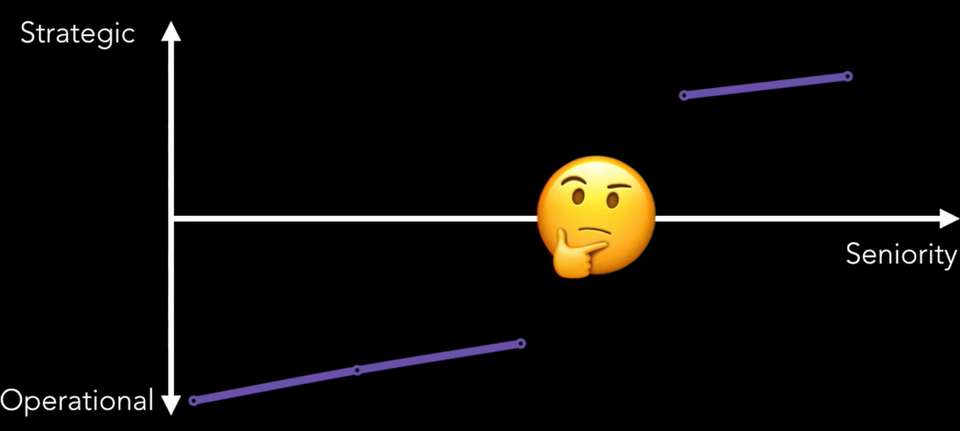Growing Product Leaders

This article is primarily written for product leaders, or people who want to move into product leadership. Most people leaders would likely also find it beneficial. Let’s fix career progression! (A short version of this article was originally posted on my LinkedIn.)
"The problem with product management is that your career path is doomed." -Johnathan Nightingale.
This post was inspired by Johnathan Nightingale’s ProductTank Toronto presentation from 2019. If you are a product person, I recommend that you watch it before you read this article.1
This talk goes into the organizational challenges of why it's so hard to move from an Individual Contributor (IC) role into product leadership, primarily around what it means to be doing operational work vs strategic work. No one teaches us how to bridge that gap, and trying to make a move means adding yet another role to your average overworked but ambitious PMs. At least now, many more companies have an advanced IC career track through Staff and Principal PM roles.
Musings on pay and banding.
If you watched the talk, it also goes into IBM’s banding system. I can’t help but talk about it a bit. I too had no idea what these meant until very late in my stay at IBM. They are applied so inconsistently. I was stuck at the entry level band for several years, and by the time I finally got the promotion to “doing normal work”, a corporate IBM director told me I should be way higher for my responsibilities, and that my salary was obscenely low.
It’s sometimes strange to consider the implications of what a promotion means. By then, I was making more than my dad had ever made. I thought I had made it. Then people reveal to you the true nature of the tech salary. I still think about that conversation. When people tell me what my work is worth TODAY, I pause to wonder if this is real.
The Current State
Many of us fell into leadership. Someone quit and they needed someone to fill the role. You were the best at your IC role, so you got promoted. There were enough organizational gaps you filled so eventually you got promoted. You needed more PMs to do the work, so you became a product leader.
None of this is intentional, and when you became a leader, there was limited training on what it means to be a leader. You now have 5 jobs:
- How do you manage a team?
- How do you create a coherent product strategy?
- How do you manage the leadership level stakeholders?
- How do you help set the portfolio/company strategy?
- How does your team work together? (AKA Product Operations)
(And if you were promoted internally, you still have your old job until the transition is over.)
Out of these 5, what do you have experience with? If you were a standard PM, maybe a bit of #2 and a touch of #3, but this is now on a whole new level. If you are lucky, your company provides you with management training to take care of People Management. If you are proactive, you get a coach to help you with strategy & stakeholders. If you work 80 hours a week, you might have time to start thinking about #5.
We expect individuals to take the initiative to take on major strategic projects to move into management. Maybe they have been taking evenings to complete an MBA. Perhaps they are on the board of a non-profit in their spare time. Perhaps they moonlight with their own restaurant on the side.
The Issue Is Systemic
Read the last 2 paragraphs again. Around all of these things is the notion of individual responsibility, and they sound terrible for a work-life balance. If you want to move up, you have to work all of these extra hours and sink in your personal time and resources to do so. This is how most of us have moved up, and we might not know how to do things better.
The Impact: You will promote people who have or require no work-life balance. You will disproportionately impact parents (especially mothers), caregivers, people with hobbies. You will burn out your workers with these expectations, and they are more likely to get promoted outside your company than inside it.
The Questions: Is this the culture you want to build? How do you promote from within to grow your people? What needs to change?
The Reality: You either grow your ICs, or they leave anyway AND feel resentment towards you (personally and towards the company). It should be normalized to raise people up beyond your current organization.
At some point in time, someone took a chance on us and gave us the space to grow. Let’s talk about what we need to change to grow leaders within our organizations.
Identifying Leaders
What makes a good leader? Ask anyone on a team, and they will tell you who you look up to. They're the ones who all the other teams love, do inspiring work connected to the larger strategy, and pushes everyone to work better.
A great team has many people working at this level, and certainly any of these people could make a great candidate for promotion. Not everyone wants to be a manager even if they have the aptitude for it. Ask them.
For those who want to become a manager, ask why. There are many reasons for wanting to lead:
- Frustrated with the current state, and thinking that they can overcome those challenges with more power.
- They want to help others grow.
- They have strategic ideas that require power to push.
- They’re better at leading and coaching than doing.
None of these are wrong or bad, and there’s never just a single reason for it. It’s a way to work through the concept of leadership and what this could mean beyond a bigger pay cheque.
Opportunities for Growth
How do we systemically make room for these future leaders to grow into their potential?
- Ask about their career goals. If they want to be an IC for the next foreseeable future, don't force them into it.
- Discuss what they might need to do to move to where they want to be. Often this is a short term heavy strategic project that the IC wants to do because they see a strategic need.
- As a leader, you need to make room for them to do this work, which means reallocating the IC's existing work on your team. A strategic project on top of a full existing workload is futile.
- As the IC, you need to be able to stop doing your current work. Being promoted into a managerial role often means you can't keep doing PM work. Is this what you want? A short term project is a good way to find out.
- Feedback. Coach the IC on the journey, or help them find someone in the company who would be a good person to provide leadership guidance. Sometimes it's hard to be a coach and the performance evaluator at the same time.
- Iterate. Did they do well? Check in to see if they’ve changed their mind. Give them more challenging projects.
- Promote. The more leadership challenges the IC takes on, the sooner you'll need to promote them. Do you have room for this person to grow within your organization? Do you want to encourage them to go elsewhere? It's okay to do that. Yes it is tragic to lose a brilliant IC, but healthy ecosystems require cross-pollination of ideas.
The Promotion
A promotion is to recognize the individual’s expertise around the role, and possibly to formalize this expertise wherever necessary.
Promotions should never be an incentive for good work
“If you finish this project, you will get this promotion” is such a terrible idea. Most projects are tied to things entirely outside the individual’s control. Completion is an output, not a measurement of skill, self-directed work, or organizational impact. What if your organization doesn’t have room for a promotion when the project is over? Was it an empty promise? How many times have you heard this, finished the project with flying colours, and not received that promotion or transfer?
You pay people to do good work. That is the incentive. Promotions are a recognition of skill and quality because those skills are in high demand elsewhere and turnover is really, really expensive.
There’s sometimes not a lot of room to grow people internally, especially into management, and that’s okay. Grow them, help them leave and succeed. You will be the best boss they’ve ever had. You will learn a lot from this experience. You will attract great talent to come work for you.
Giving people opportunities to do certain work is great, but if they’re regularly doing the work of a principal or a lead, they need to be compensated for that level of work. Be honest and consistent with your team. Give promotions where they are due.
Last but not least, don’t forget about your own personal career growth. What are you getting out of it? If I am not growing anymore, it’s time to move on. As a leader, if there are systemic roadblocks that I cannot overcome to help my team, then this is not the place where I can make an impact.
Build the Best Team
People rarely leave if they feel like they’re growing in the right direction. A team that’s hungry for growth is a strong team to help you achieve your goals. Your role as the leader is to activate your team to do the work that you cannot do on your own.
You grow your team by:
- Finding out how they want to grow;
- Giving them the room to explore in that realm;
- Promoting people whenever reasonable.
To do this, your organization requires some sort of structure, ideally both an IC and a manager path. It doesn’t necessarily need to be a title since flat hierarchies are often helpful for smaller team power dynamics. Work with your HR partner to understand market rates and keep your great people.
None of these things are passive. All require you to take an active role in your people’s career interests. It shouldn’t have been this hard for you to get to where you are today. For the benefit of our discipline, we need to build better pathways for future PMs to grow into leadership.
Let's change the way we talk about about career progression in product and be intentional about what product leadership looks like in our respective organizations.
Other Stuff
- Melissa Nightingale was the person who introduced me to the talk. She and Johnathan publishes worldsbestnewsletter.com (and do great work through Raw Signal Group). It is, by far, the best leadership newsletter and one I read religiously. If you are a people manager, I highly, highly recommend that you subscribe.
- I wrote about Why I promote select external consultants.
- We talk a lot about business cases. I’ve been thinking a lot about intangible value.
- This is a slight deviation from my usual writings, partly because I posted it first on LinkedIn. Let me know in the comments if you want to see more content like this, or rather the much more long form exploration of ideas like I usually do, or both!
